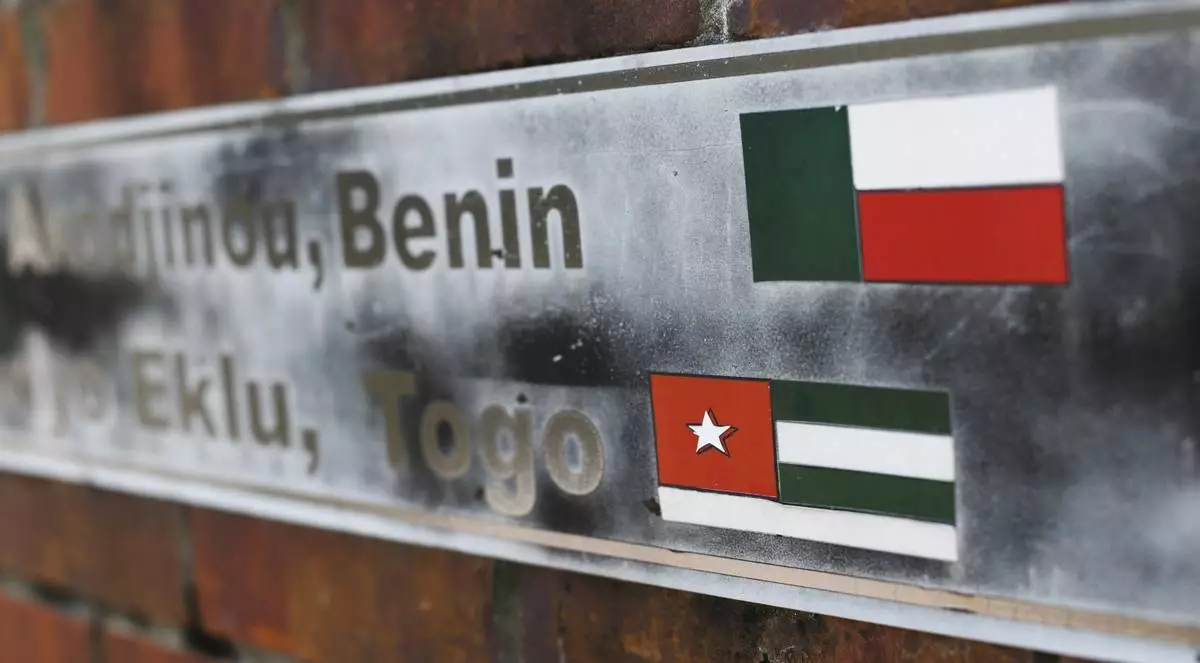A woman who accused rappers Jay-Z and Sean “Diddy” Combs of sexually assaulting her when she was 13 at an awards show after-party has acknowledged certain inconsistencies in her story, while her lawyer said he will continue to vet her claims.
The unnamed woman described being driven from Rochester, New York, to New York City for the MTV Video Music Awards in 2000 and then Combs’ limo driver offering her a ride to an after-party, NBC News reported on Friday. She claimed she spoke with musicians Benji Madden and his brother at the party, and her father picked her up after the alleged assault.
But a representative of the Maddens confirmed to NBC that they were on tour in the Midwest during the VMAs, while her father said he doesn’t remember the drive home of more than five hours. The woman’s friend who reportedly drove her to the awards has since died, NBC reported.
The woman had first sued Combs, alleging she was raped at an after-party, and then amended the lawsuit Sunday to include a new allegation that Jay-Z, whose legal name is Shawn Carter, also was at the party and participated in the sexual assault.
Jay-Z said in a statement that the article proves Tony Buzbee, a personal injury lawyer in Houston, filed a false complaint against him for money and fame.
“This incident didn’t happen and yet he filed it in court and doubled down in the press,” he said. “True Justice is coming. We fight FROM victory, not FOR victory. This was over before it began. This 1-800 lawyer doesn’t realize it yet, but, soon.”
Buzbee told The Associated in an email that if someone raises a new issue which didn’t previously exist, her legal team's job is to continue collecting facts and evidence.
Jay-Z’s attorney, Alex Spiro, asked the court to dismiss the case, saying in a statement, “It is stunning that a lawyer would not only file such a serious complaint without proper vetting, but would make things worse by further peddling this false story in the press.”
The woman admitted to making “some mistakes” when recalling that night, but said she stands by her allegations.
The litigation is part of a wave of sexual assault lawsuits levied against Combs as the hip-hop mogul remains in custody in New York awaiting trial on federal sex trafficking charges.
The unnamed woman said that while she was in the limousine, she was asked to sign a nondisclosure document. Once at the party, the lawsuit said, she took a drink that made her feel “woozy and lightheaded” and went into a bedroom to lie down.
She said Combs and Jay-Z then barged into the room, along with another unnamed celebrity, and raped her. The woman said she eventually escaped the room, fled the house and called for a ride from a nearby gas station.
Jay-Z, a 24-time Grammy award winning rapper, producer and music mogul, anonymously sued Buzbee last month, alleging he was attempting to blackmail the rapper by threatening to make the rape allegation public if he did not agree to a legal settlement. Jay-Z said Buzbee sent a letter to his lawyer appearing to seek a settlement, which had the “opposite effect” on him.
Buzbee previously said the notion that he was trying to blackmail Jay-Z is “stupid and laughable” and his letter simply sought confidential mediation in the litigation.
Buzbee announced at a news conference in October that he represents some 120 people, men and women, with allegations of sexual misconduct against Combs.
His firm, which has set up a toll-free phone line for accusers, began filing a wave of lawsuits against the hip-hop mogul a few weeks later.
Combs was denied bail a third time last month. He has pleaded not guilty to charges he coerced and abused women for years and faces trial in May.
Lawyers for Combs did not immediately respond to emails seeking comment.
Jay-Z and Combs are part of a generation of hip-hop titans who rose to prominence in the 2000s, emerging as wide-ranging entrepreneurs and two of the world’s wealthiest rappers. Earlier this year, Forbes estimated Jay-Z’s net worth to be $2.5 billion.
The artists have collaborated over the years, with Jay-Z featured on Combs’ debut album, “No Way Out,” and Combs appearing on Jay-Z’s sophomore album, “In My Lifetime, Vol. 1.”
While frequently photographed together at events, they also have been business competitors. Diddy launched his Bad Boy Records around the same time Jay-Z launched his Roc-A-Fella record label.

FILE - Sean "Diddy" Combs arrives at the LA Premiere of "The Four: Battle For Stardom" at the CBS Radford Studio Center on May 30, 2018, in Los Angeles. (Photo by Willy Sanjuan/Invision/AP, File)

FILE - Jay-Z smiles ahead of the Champions League final soccer match between Borussia Dortmund and Real Madrid at Wembley stadium in London, Saturday, June 1, 2024. (AP Photo/Kirsty Wigglesworth, File)
DAKAR, Senegal (AP) — When Nadege Anelka first came to the West African country of Benin from her home island of Martinique, a French overseas territory in the Caribbean, the 57-year-old travel agent said she had a feeling of deja vu.
“A lot of the people reminded me of my grandparents, the way they wore their headscarves, their mannerisms, their mentality,” she said.
Feeling at home in Benin, Anelka decided to settle there last July and open a travel agency. She hopes to become a citizen by taking advantage of a law passed in September that grants citizenship to those who can trace their lineage to the slave trade.
The new law is part of a broader effort by Benin to reckon with its own historical role in the slave trade.
The law is open to all over 18 who do not already hold other African citizenship and can provide proof that an ancestor was deported via the slave trade from anywhere in sub-Saharan Africa. Beninese authorities accept DNA tests, authenticated testimonies and family records.
Anelka used “Anchoukaj" ("Affiliation” in Antillean Creole), a website recognized by Benin to trace her heritage, proving that her ancestors were slaves in Martinique. If her application is successful, she will receive a provisional certificate of nationality valid for three years. To get citizenship, she'll be required to stay at least once in Benin during that period.
Benin is not the first country to grant citizenship to descendants of slaves. Earlier this month, Ghana naturalized 524 African Americans after the West African country’s president, Nana Akufo-Addo, invited them to “come home” in 2019, as part of the 400th anniversary of the arrival of the first enslaved Africans in North America in 1619.
But Benin’s citizenship law carries added significance in part because of the role it played in the slave trade as one of the main points of departure.
An estimated 1.5 million slaves were deported from the Bight of Benin, a territory that includes modern-day Benin and Togo and part of modern-day Nigeria, said Ana Lucia Araujo, a professor of history at Howard University who has spent years researching Benin’s role.
The coastal town of Ouidah was one of Africa’s most active slave-trading ports in the 18th and 19th centuries. Close to a million men, women and children were captured, chained and forced onto ships there, mainly destined for what would become the United States and Brazil and the Caribbean.
Benin has struggled to resolve its legacy of complicity. For over 200 years, powerful kings captured and sold slaves to Portuguese, French and British merchants.
The kingdoms still exist today as tribal networks, and so do the groups that were raided. Rumors that President Patrice Talon is a descendant of slave merchants sparked much debate while he was running for office in 2016. Talon has never publicly addressed the rumors.
Benin has openly acknowledged its role in the slave trade, a stance not shared by many other African nations that participated. In the 1990s, Benin hosted an international conference, sponsored by UNESCO, to examine how and where slaves were sold.
And in 1999, President Mathieu Kérékou fell to his knees whiling visiting a church in Baltimore and issued an apology to African Americans for Africa’s involvement in the slave trade.
Alongside this national reckoning, “memorial tourism” centered around the legacy of the slave trade has become a key strategy of Benin’s government to attract foreigners.
Memorial sites are mostly in Ouidah. They include the “Door of No Return,” which marks the point from which many enslaved people were shipped across the Atlantic, as well as the town’s history museum.
At the “Tree of Forgetfulness,” enslaved people were said to be symbolically forced to forget their past lives.
“Memories of the slave trade are present on both sides of the Atlantic, but only one of these sides is well known,” said Sindé Cheketé, the head of Benin’s state-run tourism agency.
Nate Debos, 37, an American musician living in New Orleans, learned about Benin's citizenship law while visiting for the Porto Novo mask festival. He had never been to West Africa before, but his interest in the Vodun religion led him there.
Debos is the president of an association called New Orleans National Vodou Day. It mirrors Benin’s Vodun Day, a national holiday on Jan. 10 with a festival in Ouidah celebrating Vodun, an official religion in Benin, practiced by at least a million people in the country.
It originated in the kingdom of Dahomey — in the south of present-day Benin — and revolves around the worship of spirits and ancestors through rituals and offerings. Slavery brought Vodun to the Americas and the Caribbean, where it became Vodou, a blend with Catholicism.
“Vodou is one of the chains that connects Africa to the Americas,” said Araujo, the professor. “For enslaved Africans, it was a way of resisting slavery.”
European colonial powers and slave owners sought to suppress African cultural and religious practices. Vodun was preserved through syncretism, as African deities and spirits were merged with or disguised as Catholic saints.
“Our African ancestors were not tribal savages, they had sophisticated cultures with very noble and beautiful spiritual practices," Debos said.
He now seeks to establish more partnerships with collectives practicing Vodun in Benin, which would require him to stay in the country for longer periods. He will apply for citizenship, but not with an intention to move there permanently.
“At the end of the day, I am an American, even when I am dressed in the wonderful fabrics and suits they have in Benin,” Debos said.
Anelka, the travel agent now living in Benin, said her motivations behind getting Beninese citizenship are mostly symbolic.
“I know I will never be completely Beninese. I will always be considered a foreigner” she said. “But I am doing this for my ancestors. It’s a way to reclaim my heritage, a way of getting reparation.”
The Associated Press receives financial support for global health and development coverage in Africa from the Gates Foundation. The AP is solely responsible for all content. Find AP’s standards for working with philanthropies, a list of supporters and funded coverage areas at AP.org.

FILE- A man paddles a canoe near a Voodoo sacred forest in Adjarra, Benin, on Wednesday, Oct. 4, 2023. (AP Photo/Sunday Alamba, File)

FILE - In this Nov. 17, 2011 file photo, a fisherman stands amidst city trash brought in by the tide, as he prepares to launch his fishing boat, in Cotonou, Benin. (AP Photo/Rebecca Blackwell, File)

FILE - In this Jan. 29, 2019 file photo, the flags of the nations of Benin and Togo, the west African homes of the survivors of the slave ship Clotilda, remain on display on a monument at what was the Africatown Welcome Center in Mobile, Ala. (AP Photo/Julie Bennett, File)

Nate Debos, known by his stage name NaTRILL Dizaster, left, who said he would apply for Benin citizenship, poses with Ay.Yon Michaels, right, of the rap duo Ayakashi Krewe inside an old school bus in New Orleans, Thursday, Dec. 5, 2024. (AP Photo/Gerald Herbert)

Nate Debos, known by his stage name NaTRILL Dizaster, who said he would apply for Benin citizenship, poses inside an old school bus in New Orleans, Thursday, Dec. 5, 2024. (AP Photo/Gerald Herbert)
















